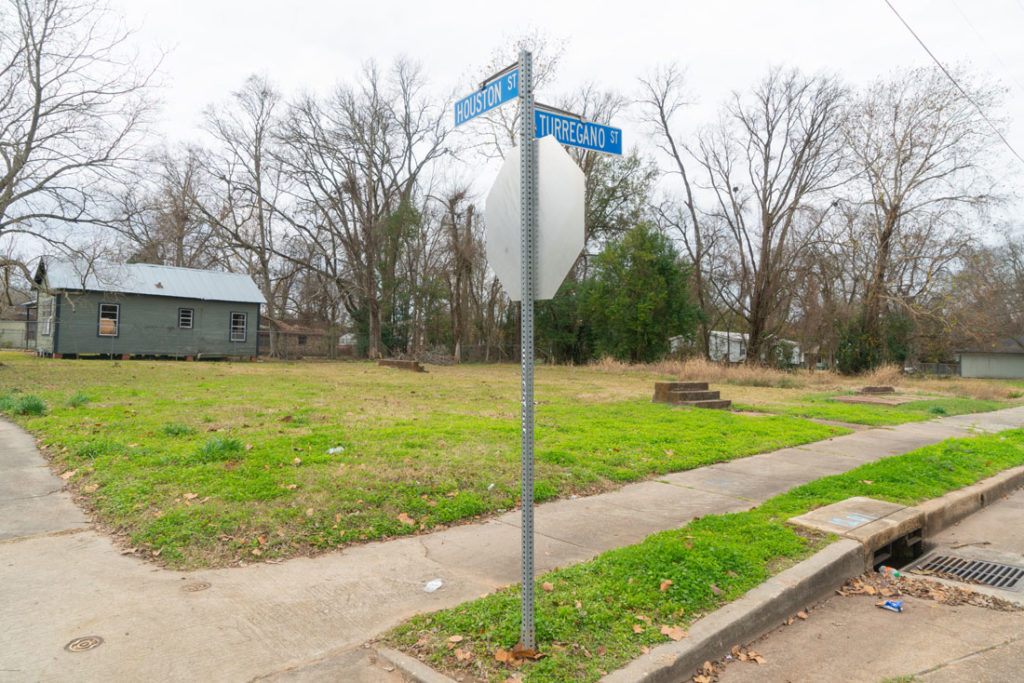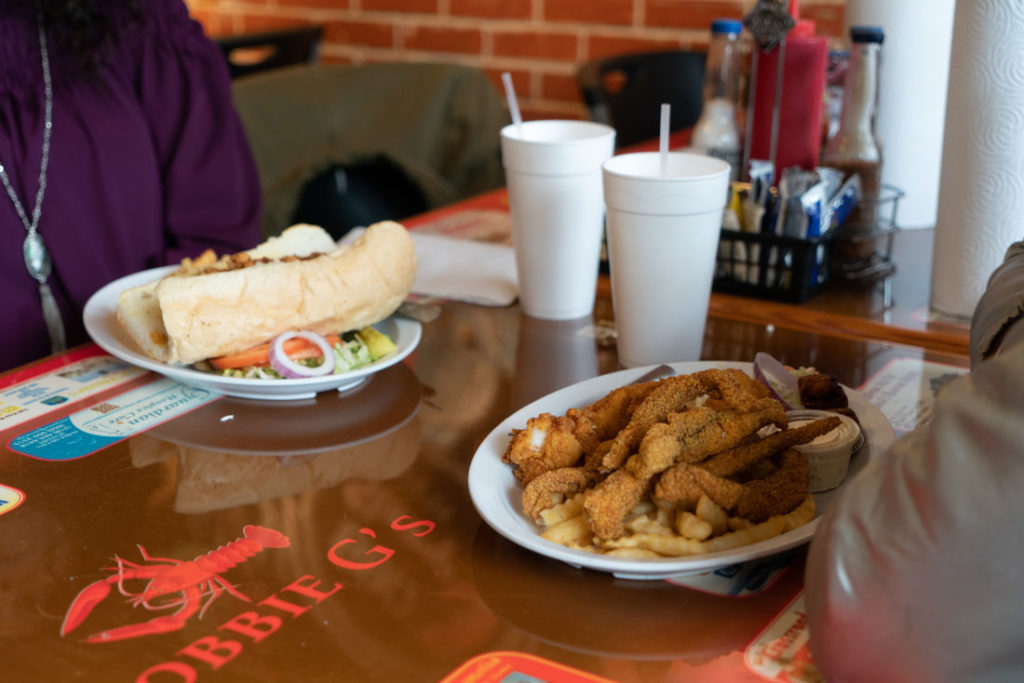
“The greatest investment she gave me was her time.”
He didn’t understand how it worked.
Standing in his parent’s tiny laundry room, eight-year-old Tareq Humphrey stared at the rectangular door of the dryer, fascinated by the little mechanism that triggers the dryer to stop the cycle when the door is opened. Using a flashlight, he poked around the little notch, trying to make sense of it, but it was buried inside the machine. He knew that he shouldn’t, but the urge to uncover the mystery outweighed the inevitability of his dad’s displeasure with his experimentation.
Tareq grasped the rusted red screwdriver and fit it into the first screw. He got the door totally off when suddenly his mom jovially announced from another room, “Natalie’s here!”
Tareq’s cousin Natalie Hurks is the “dopest” of the cousins, the oldest, and his favorite. He dropped the screwdriver and bolted to join his little brother and their parents at the window; his daddy’s strong arms held the curtain open. Their jaws dropped as Natalie pulled into the driveway driving a brand new, shiny, black, convertible Mazda Miata.
“Whoa,” Tareq heard his little brother whisper behind him as he raced down the front steps two by two to greet his 23-year-old cousin. Natalie stepped out of the car, and Tareq asked in his blunt way, “What guy are you dating?”
Natalie laughed and pulled him in for a hug. “No one. This is my own car.”
“How’d you get a car like that?” he pressed, doubtfully.
“I’m an engineer.”
His eyes got wide—engineer? What was that? He was just about to ask when they both heard Tareq’s dad yell from upstairs, wondering what had happened to the dryer.
*****
Fast forward 30 years: It’s 8:00 AM on a Saturday. Tareq holds a white to-go cup of coffee, bleary eyed from a late night out with all his cousins—including Natalie, who now lives in Cincinnati. Tareq lives in Seattle, but everyone’s made the trip home to Alexandria, Louisiana, for Thanksgiving. Natalie has joined him at his childhood home.
“Look at you, so fabulous and polished,” he dotes. “You look like a little politician, Natalie 2020.”
“No, not at all,” she waves his compliment away.
Even now, decades after he first saw Natalie with her new car, Tareq looks up to her. He’s followed in her footsteps on purpose, finding inspiration and support from her at each difficult or unknown place. He wants her and the world to know how influential she was to him. Not just because he also became an engineer, but also because she is his cousin and family means everything to him.
They start walking around, checking out the old places they hung out and reminiscing about what it was like growing up in their close-knit, Louisiana town.
Back then, every other block had a church.
“We had to go to every Bible school. We had to go to every church,” Natalie reminds Tareq.
“Yup!” he laughs, memory sparked. “We had to go to all of them. Our church had it one week. We had to go to all of theirs, too. Daddy said it was to keep us busy and out of trouble in the summer.”
They reach the intersection of Houston and Turregano Streets. Tareq stands on three crumbling concrete steps—the only remnant of the house where he grew up. The building burned down years ago, after his family moved and rented it out, but the steps remain; his parents still own the land, and Tareq said they won’t sell it.
“It’s Alexandria. It’s home,” he offers as an explanation.
Standing on the steps, Tareq reminisces—he can almost hear his dad coming out in the evening when the streetlights turned on, yelling, “Tareq! Get in the house.”

The vacant lot on the corner of Houston and Turregano Streets, where Tareq’s childhood home once stood.
“My dad was the kind of person that was very vocal. We could be way over there,” he points down the street. “You’d hear him, and then you’d have to come home,” he says. “But we owned the football, so we’d have to stop the game. Once, we let the other kids keep using it, and Daddy was like, ‘Where your football at?’
“They playing with it.”
“’Go get your football,’ he demanded,” Tareq says, his voice fading into nostalgia. His dad passed away a few years ago.
One of 10 children and the brother of Natalie’s dad, Tareq’s father had completed a few years of his college education. But when news came from Tareq’s mom that their first baby was on the way, he quit school to make money for the family. Over the years, that most often meant manual labor and juggling more than one job at a time.
“I just thought my dad liked to work. I didn’t know he had multiple jobs,” Tareq says.
When Tareq got a bit older, his dad told him, “I do all of this so you won’t have to.” He set education as the priority in the Humphrey house, believing that was the best way to set yourself apart and give your life options. In Daddy’s house, you were going to get an education.
As a young boy, Tareq wondered if there were other jobs to make money, but it never occurred to him that he could make a living off the curiosity that drove him to do things like take apart the dryer. Not until Natalie came home and began talking about engineering.
Now, Tareq admits that he so admired his cousin that it wouldn’t have mattered what she did for a living—he would have followed her anywhere.
“If she’d have gone to Harvard, I’d have gone to Harvard. If she’d been a doctor, I’d have been a doctor,” he says. He just wanted to be like Natalie.
*****
After seeing the old house, Tareq and Natalie tour the Proctor and Gamble manufacturing plant that Natalie managed for years, where she was hired as one of the company’s first black engineers in 1989. After 30 years with the company, she’s now a director.
Natalie brought Tareq to the plant years ago to fill in the picture of what an engineer does. Up until then, his information consisted of conversations with Natalie on his mom’s couch that would go something like this:
“Silver Engineer? As in like a train conductor?” Tareq would ask, conjuring images of men covered in soot, slinging coal into the massive engines of trains. “You can’t do that,” he’d declare to his fashionable cousin. “You’d get your fancy clothes dirty.”
“No, not a train conductor, a civil engineer,” she’d laugh. “I run the Proctor and Gamble plant across town, the place that makes products like Tide.”
He’d look at her with a bit more clarity, but still confused.
But Natalie knew young Tareq still didn’t understand. For her, helping Tareq and his little brother was personal. “I needed them to know what was possible. We didn’t grow up with a lot of material stuff. We had a lot of love, support, and people who were rooting for us,” she explains.
“But I became an engineer without having met an engineer, and I knew that once Tareq got exposure it’d be a good option for him. He was always driven. He wanted to get up, get out, make a difference, and conquer the world.”
*****
Both Tareq and his little brother are now engineers. During their schooling and early careers, Natalie helped however she could: directing them to scholarships, financial aid, and grant applications; advising them on how to stretch a dollar in college (“Don’t blow your tax refund!” she’d say); and continuing to guide him on money management like buying a house, investing in stocks, and saving for retirement after he landed his first job at NASA.
“She was and is always just there,” Tareq says. “The greatest investment she gave me was her time. She made sure I figured out a way.”
As the two proceed to reminisce and walk through the plant, Natalie stops multiple times to greet old friends and coworkers. They seem more like family—she calls them by their first names, hugs them, and asks about their kids and grandparents.
“This town and these people really keep me grounded,” says Natalie. “My mama will be the first to let me know, ‘you ain’t all that.’ And she’s right. I’m proud of Alexandria, the community that put its arms round me.”
And she, in turn, continues that community embrace of her cousins. “Natalie is the reason that I can now take care of my aging parents,” Tareq says.

Cousins Natalie and Tareq enjoy lunch together at a local eatery where they grew up in Alexandria, Louisiana.
“Your mom is an angel on Earth,” Natalie says. Tareq’s mom texts the entire family their own bible verse every morning.
“It was just family. It was all about support, and food. That’s how you show love,” she says.
As if on cue, Tareq asks about lunch. They head to Robbie G’s, the local spot. Tareq nibbles on a plate of fried catfish and Natalie, a po-boy sandwich. And as they sip on their sweet teas, the door swings open, and they erupt in greeting. It’s another one of their cousins.
*****
Photography and videography by Keeb White. Additional reporting by Amanda Finney.
